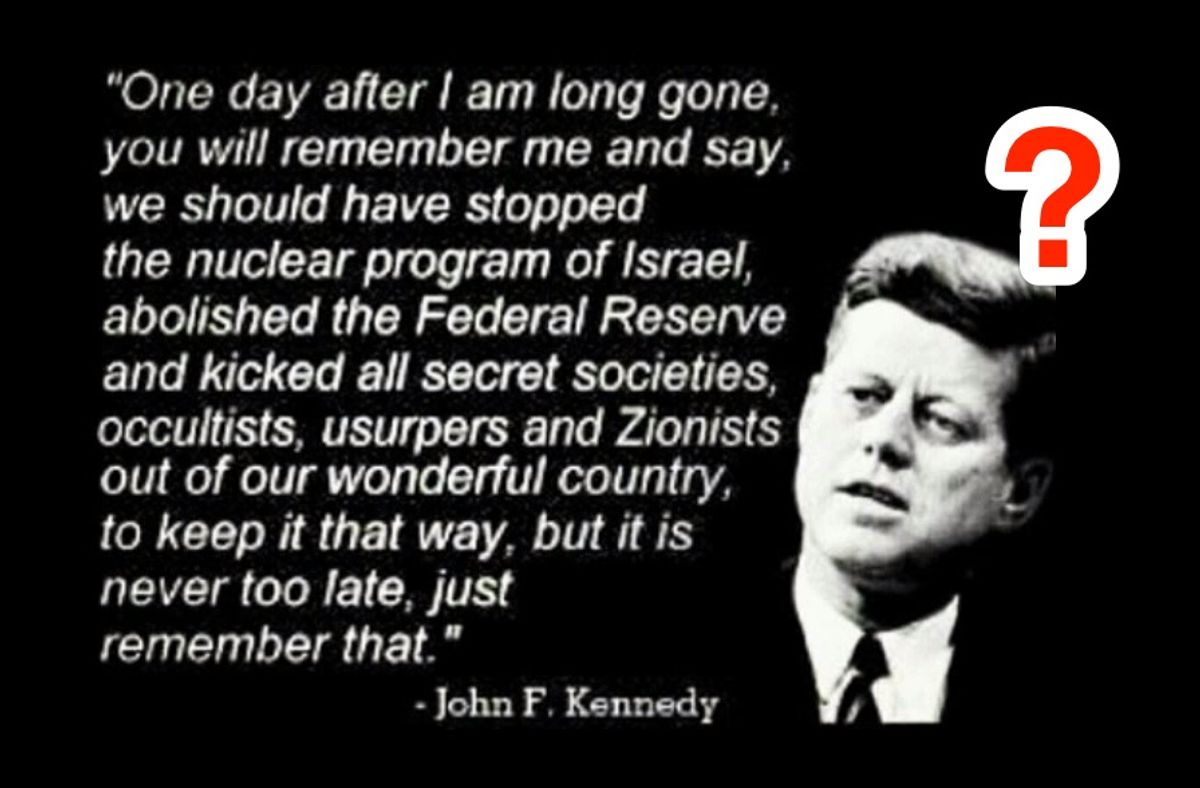In April 2016, a quote of indeterminate age and origin attributed to John F. Kennedy was circulated on social media, words in which the former president prophetically warned that someday after he was "long gone, we would remember him" and realize "we should have stopped the nuclear program of Israel, abolished the Federal Reserve and kicked all secret societies, occultists, usurpers and Zionists out of our wonderful country":
JFK,:ONE DAY AFTER I AM LONG GONE, YOU WILL REMEMBER ME AND SAY, WE SHOULD HAVE STOPPED THE NUCLEAR PROGRAM OF ISRAEL,...
Posted by Humberto Docimo on Saturday, April 2, 2016
(The quote wasn't new to April 2016, as readers had asked us about it as far back as March 2012.)
President John F. Kennedy, who was assassinated in 1963, remains a revered figure to many with whom these words would resonate; but the notion of such an aptly appealing, contemporary commentary's having been lost to the annals of history is a hard sell with respect to plausibility. Kennedy's words have been cataloged and studied by countless historians and academics; such a seemingly-prophetic quote about Israel, the Federal Reserve, "Zionists," and other issues still relevant half a century after his death would surely have piqued the interest of historians and history aficionados long before now. Yet there appears to be no record of anyone's having attributed this statement to JFK until around 2012 or so.
The predictive nature of the quote is another telling aspect of its unlikelihood. John F. Kennedy was shot and killed in Dallas on 22 November 1963; and the manner in which he died was sudden, violent, and unexpected. A old man near the end of his life or a younger man slowly dying of an untreatable disease might issue a maudlin "when I'm gone" statement; but the youngest U.S. president ever elected, who was still in the White House when he died, wasn't a prime candidate for making eerie "one day when I'm gone" prophecies.
We contacted the John F. Kennedy Presidential Library and Museum in Boston for verification, and a helpful archivist there pointed out several other factors that support moving this item into the "False" column:
The closest match to any of the ideas referenced in the putative quote that we could find was an 18 May 1963 telegram from the Department of State to the Embassy in Israel (portions of which remained classified), in which President Kennedy expressed reservations about an Israeli nuclear weapons program:
We are concerned with the disturbing effects on world stability which would accompany the development of a nuclear weapons capability by Israel. I cannot imagine that the Arabs would refrain from turning to the Soviet Union for assistance if Israel were to develop a nuclear weapons capability—with all the consequences this would hold. But the problem is much larger than its impact on the Middle East. Development of a nuclear weapons capability by Israel would almost certainly lead other larger countries, that have so far refrained from such development, to feel that they must follow suit.
As I made clear in my press conference of May 8, we have a deep commitment to the security of Israel. In addition this country supports Israel in a wide variety of other ways which are well known to both of us.
As the Kennedy Library archivist told us, "Given this evidence to the contrary, it seems rather astounding that JFK could have [made] the statement attributed to him."

